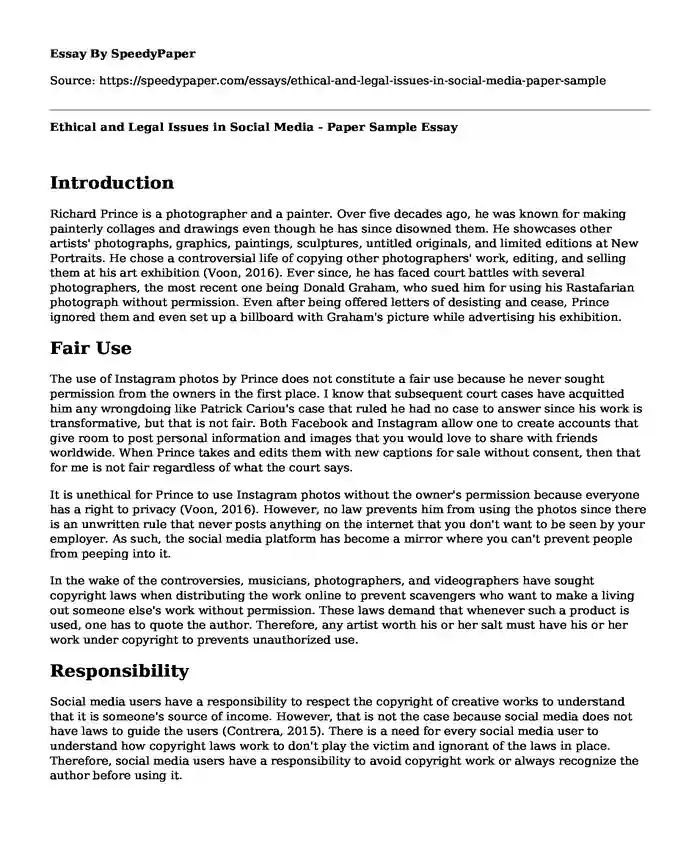
| Type of paper: | Essay |
| Categories: | Law Ethics Art Social media |
| Pages: | 3 |
| Wordcount: | 604 words |
Introduction
Richard Prince is a photographer and a painter. Over five decades ago, he was known for making painterly collages and drawings even though he has since disowned them. He showcases other artists' photographs, graphics, paintings, sculptures, untitled originals, and limited editions at New Portraits. He chose a controversial life of copying other photographers' work, editing, and selling them at his art exhibition (Voon, 2016). Ever since, he has faced court battles with several photographers, the most recent one being Donald Graham, who sued him for using his Rastafarian photograph without permission. Even after being offered letters of desisting and cease, Prince ignored them and even set up a billboard with Graham's picture while advertising his exhibition.
Fair Use
The use of Instagram photos by Prince does not constitute a fair use because he never sought permission from the owners in the first place. I know that subsequent court cases have acquitted him any wrongdoing like Patrick Cariou's case that ruled he had no case to answer since his work is transformative, but that is not fair. Both Facebook and Instagram allow one to create accounts that give room to post personal information and images that you would love to share with friends worldwide. When Prince takes and edits them with new captions for sale without consent, then that for me is not fair regardless of what the court says.
It is unethical for Prince to use Instagram photos without the owner's permission because everyone has a right to privacy (Voon, 2016). However, no law prevents him from using the photos since there is an unwritten rule that never posts anything on the internet that you don't want to be seen by your employer. As such, the social media platform has become a mirror where you can't prevent people from peeping into it.
In the wake of the controversies, musicians, photographers, and videographers have sought copyright laws when distributing the work online to prevent scavengers who want to make a living out someone else's work without permission. These laws demand that whenever such a product is used, one has to quote the author. Therefore, any artist worth his or her salt must have his or her work under copyright to prevents unauthorized use.
Responsibility
Social media users have a responsibility to respect the copyright of creative works to understand that it is someone's source of income. However, that is not the case because social media does not have laws to guide the users (Contrera, 2015). There is a need for every social media user to understand how copyright laws work to don't play the victim and ignorant of the laws in place. Therefore, social media users have a responsibility to avoid copyright work or always recognize the author before using it.
Conclusion
As the in charge, I will recommend several ideas that would enlighten social media users on the steps to take when uploading or downloading items on social media. I will encourage every artist to ensure that their work is under copyright before uploading it on social media. It seems like a market on a freeroll, and therefore, copyright will limit the stealing of other people's work. To prevent a repeat of circumstances where a court ruled that no law forbids users from sharing like in Graham's case, subsequently, we shall have clear guidelines forming our mode of engagement.
References
Contrera, J. (2015). A reminder that your Instagram photos aren't yours: Someone else can sell them for $90,000. Washington Post. Retrieved from
https://www.washingtonpost.com/news/arts-and-entertainment/wp/2015/05/25/a-reminder-that-your-instagram-photos-arent-really-yours-someone-else-can-sell-them-for-90000/
Voon, C. (2016). Photographer Sues Artist Richard Prince, Larry Gagosian, and His Gallery. Washington Post. Retrieved from
https://hyperallergic.com/265991/photographer-sues-artist-richard-prince-larry-gagosian-and-his-gallery/.
Cite this page
Ethical and Legal Issues in Social Media - Paper Sample. (2023, Nov 26). Retrieved from https://speedypaper.net/essays/ethical-and-legal-issues-in-social-media-paper-sample
Request Removal
If you are the original author of this essay and no longer wish to have it published on the SpeedyPaper website, please click below to request its removal:
- Free Essay Sample: Rita Dove and Her Writing Experience
- Free Paper for Students: Op-ed about Eliminating Cash Bail System in Philadelphia
- Paper Example: Two Tort of Negligence
- Paper Example. the Observation of the Mural the Varrio Si, Yonkes No!
- Paper Example. Tourism as a Human Right
- State Prisons vs Local Jails: Who Has the Edge in Network Contract Negotiations?
- Essay on Juvenile Justice System Transformed: Rise of Minority Court & Teen Courts
Popular categories




